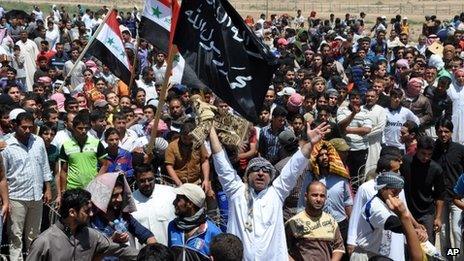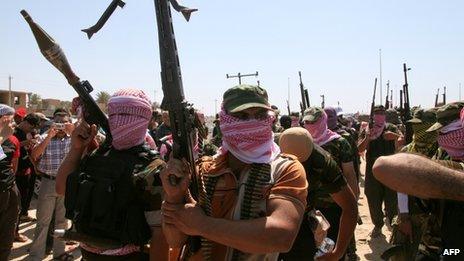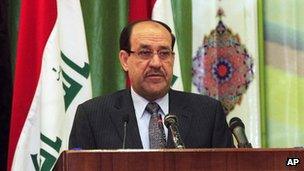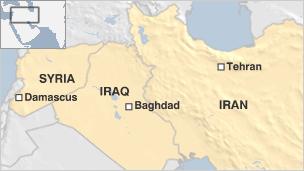Iraq: Prospects of partition as violence takes its toll
- Published

Protests swept Iraq after security forces killed 23 Sunnis in Kirkuk province
Some observers see the current flare-up in Iraq as the worst crisis to afflict the country since its emergence into statehood in 1921.
Others deem it the most critical moment since the fall of Saddam Hussein in 2003... or since the final withdrawal of US troops at the end of 2011.
Many are convinced that Iraq is on the brink of a destructive sectarian civil war that would herald its disintegration as the country we know, and that agreement on partition would be the least-bad option.
Apart from its own often centrifugal internal dynamics, Iraq finds itself caught up in acute regional tensions, with its disparate components pulled in different directions by the same outside forces engaged in the struggle in neighbouring Syria, whose conflict is impacting directly on Iraq.
However you look at it, it is not good.
But that does not necessarily mean the direst predictions are fated to come true.
The country has in the past shown a remarkable ability to hobble from crisis to crisis, muddling along without either reaching a stable solution or exploding into pieces.
But a clear worst-case scenario is visible and plausible.
It would see the country fragment in turmoil on sectarian and ethnic lines between its three major communities, the majority Shia (60%), the Sunnis and the Kurds.
Warning signs
The warning signals are already there, not least in the casualty figures from the latest outbursts of violence in many parts of the country.
Most estimates agree that April was the bloodiest month since 2008. The UN says that more than 700 people were killed in bomb attacks and other violence including more than 430 civilians.
Much of the violence came towards the end of the month, following the incident at the town of Hawija in Kirkuk province on 23 April when security forces loyal to Shia Prime Minister Nouri Maliki killed a large number of Sunni protestors.
This prompted more disturbances and incidents, especially in Sunni areas which have been in uproar against Mr Maliki's government since last December.
Insurgent bombers, presumed to be linked to al-Qaeda and its "Islamic State in Iraq", also stepped up their provocative bomb outrages aimed at Shia population centres.

The presence of a Sunni militant insurgency has never gone away
None of this came out of the blue. It is part of a logical progression going back to the formation of the current government in December 2010, a world-record length of time after the March general elections that year.
The government led by Nouri Maliki was supposed to be one of national partnership.
Under a power-sharing deal brokered by Kurdish leader Masoud Barzani, the man whose Iraqiyya coalition actually came out ahead of Mr Maliki in the polls, Iyyad Allawi (a secular Shia who garnered most of the Sunni vote), was supposed to head a "Higher National Strategy Council" with considerable powers.
None of that happened. Instead of being seen as a partner, Mr Maliki has been accused increasingly of going it alone with autocratic powers stemming from his control of the entire security apparatus, including the defence and interior ministries.
Sunni participation has been increasingly marginalised and opinion alienated by Mr Maliki's failure to address key Sunni demands and complaints, especially relating to the release of detainees, counter-terrorism laws, job opportunities etc.
And in the background the insurgent activities of Sunni militants never went away.
In the year following the Maliki government's formation, violence stayed at roughly the same levels as in 2010. It worsened in 2012, and now seems to be intensifying further as the embers that have been glowing beneath the ashes burst into flames again, fanned by mounting Sunni grievances.
If Mr Maliki continues on a collision course with the Sunnis, there is a clear risk that tribal, religious and political strands will come together in such Sunni heartlands as al-Anbar and Nineveh provinces to create a real revolt against the Shia-dominated government.
Kurdish withdrawal
In March the Kurds, who have their own differences with Mr Maliki, pulled their ministers and MPs out of Baghdad. Their military forces have also expanded their zone of control in the disputed, oil-rich Kirkuk province in the wake of the Hawija incident.
So it is not hard to imagine Iraq breaking up as Sunnis and Shias plunge into a vicious sectarian civil war, while the Kurds go their own way in the north.

The Shia-dominated Iraqi government led by Nouri Maliki backs Syrian President Bashar al-Assad
Ignoring the internal dynamics and his own role, Mr Maliki himself has warned of such a civil war, saying that "sectarian strife" is coming back to Iraq from Syria.
"There is a wind behind it, and money, and plans," he said, apparently referring to support from Sunni regional powers for insurgents and dissidents.
Certainly there has been interaction from the beginning between the Sunni areas of western Iraq and the Sunni-based revolt across the border in Syria, not surprisingly given tribal and family ties as well as the to-and-fro activities of al-Qaeda-related Sunni militants.
While the Sunnis have generally favoured the Syrian rebels, Mr Maliki's Shia-dominated government, perhaps lent on by Iran, has largely backed President Bashar al-Assad despite prior differences.
So, for Iraq, a lot will depend on the outcome of the struggle in Syria. If the minority Alawite regime collapses and the country either breaks up or falls under majority Sunni rule, it may be harder to keep the Iraqi Sunnis within the central government's orbit.
If they were to team up in one way or another with a Sunni Syria, that might leave the Iraqi Shias with little option but to fall back even more on their influential co-religionists to the east, in Iran.
But within an Iraqi context, if Mr Maliki can demonstrate that Hawija was an aberration, and come up with some judicious concessions to placate Sunni opinion, he may be able to retrieve the situation, not least because the Sunnis find it hard to pull together in a unified manner.
Iranian influence
Much will also depend on what Iran actually wants, given its undoubted sway with most of the Iraqi Shia political groups - and to a lesser extent with the Kurds.
Tehran's thinking is dominated by the need to save its floundering strategic ally in Damascus.

Iraq's future is heavily weighed on the outcome of the Syria conflict and Iran's sway over Shia groups
It is hard to see how that objective could be furthered by fragmentation and chaos in Iraq. Tehran was involved in the Iraqi power-sharing deal adopted at the end of 2010 and there is no particular reason to suppose it now favours destabilisation and disintegration.
There may be separatist elements in all the main Iraqi communities but, in overall terms, partition may not be in the interest of any.
The Kurds in the north already enjoy the best of both worlds, having a degree of autonomy only a few steps short of independence while having a big (if currently disputed) share of the federal budget and a large slice of power and a vital brokering role in Baghdad.
While independence remains their dream, they know they are landlocked and dependent on neighbours - Iraq, Iran, Syria and Turkey - whose approval would be vital to their viability. For the time being, doing their own thing within a federal Iraq is the best option.
That may be one reason why this week's talks between the Kurds and Mr Maliki seem to have produced initially positive results, and could end up throwing the embattled prime minister a lifeline. Kurdish ministers and politicians are already reported to have returned to Baghdad.
The Shias "would have the most to lose from partition - and what would they gain by joining up with Iran?" said one veteran Iraqi observer.
"As for the Sunnis, not many of them want to break up Iraq - they want to control it all, like they did before for centuries."
All of this is not to say that the doomsday scenarios may not happen.
But there are still powerful factors holding Iraq together.
And at least for the moment, Iraqis are still talking about a fierce struggle at the ballot boxes, in general elections next year, and not at the sandbags and trenches.